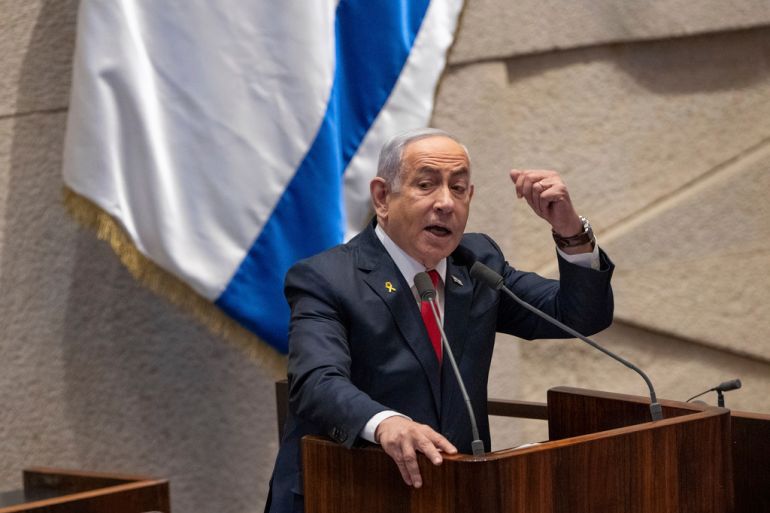Israeli PM Netanyahu offers $5m reward for captives freed from Gaza
Israel’s Benjamin Netanyahu offers big cash reward and safe way out of war-torn Gaza as inducement to free Israeli captives.
Israel’s Prime Minister Benjamin Netanyahu addresses lawmakers in the Knesset, Israel’s parliament, in occupied Jerusalem on November 18, 2024 [Ohad Zwigenberg/AP Photo]Published On 20 Nov 202420 Nov 2024
Israel’s Prime Minister Benjamin Netanyahu said $5m will be given as a reward for each captive released from Gaza and those that help free Israelis held by Hamas will be given a way out of the war-torn Palestinian territory.
Netanyahu announced the reward offer during a brief visit to Gaza on Tuesday where he was shown the Israeli military’s Netzarim Corridor – a key access road and buffer zone constructed by Israel’s army to dissect northern Gaza from the southern part.
“To those who want to leave this entanglement, I say: Whoever brings us a hostage, will find a safe way out for himself and his family. We will also give $5m for every hostage,” Netanyahu said during his brief visit to the Palestinian territory.
“The choice is yours but the result will be the same: We will bring them all back,” he said.
Israel estimates that 101 captives remain in Gaza, though around one-third of that number are now believed to have died.
Netanyahu’s reward offer comes as mass protests continue in Israel by families of captives and their supporters who are demanding that the prime minister reach a ceasefire deal with Hamas that would see their loved ones freed.
Netanyahu has repeatedly said that a military option is the only way to free all the captives and Israel’s war on Gaza will continue until that objective has been achieved.
Families of the captives have accused the Netanyahu government of not doing enough to reach a ceasefire deal while a former aide to Netanyahu has been arrested on suspicion of leaking classified materials to foreign media in an apparent bid to scuttle an earlier truce deal with Hamas.
Analysts say Netanyahu has continually torpedoed a possible end to fighting in Gaza as it would likely lead to the collapse of his far-right and ultranationalist government as well as the launch of an official investigation into the security failures by Netanyahu and other Israeli officials in the run-up to the Hamas attack on October 7. Netanyahu is also under investigation for corruption.
A man holds a sign displaying a slogan with pictures of Israeli Prime Minister Benjamin Netanyahu and a baby of the Bibas family, Israeli captives still believed to be held in the Gaza Strip, during a rally in Tel Aviv calling for a deal to free captives, on November 9, 2024 [Jack Guez/AFP]
Hamas has long accused Israeli ceasefire negotiators of not being serious about reaching an agreement to end the fighting in Gaza.
Describing the Israeli military as “doing a wonderful job” in Gaza, Netanyahu said on Tuesday that under no circumstances would Hamas return to govern the Palestinian territory.
“Here, in the central Gaza Strip and throughout the Gaza Strip, they have achieved excellent results,” Netanyahu said, according to a statement released by his office.
“And the best is yet to come. Hamas will no longer exist in Gaza,” he said.
Last week, a UN special committee investigating Israel’s war on Gaza said Israel’s policies displayed the characteristics of genocide and accused the country of “using starvation as a method of war” against Palestinian civilians in the territory.
Israel had inflicted “mass civilian casualties and life-threatening conditions” for Palestinians, the committee said.
“Since the beginning of the war, Israeli officials have publicly supported policies that strip Palestinians of the very necessities required to sustain life – food, water, and fuel.”
Israel’s war on the territory has killed nearly 44,000 Palestinians and wounded more than 104,000 others.
Leaders of the Group of 20 major economies meeting in Rio de Janeiro also called for “comprehensive” ceasefires in Gaza on Monday.
In a statement, the leaders expressed “deep concern about the catastrophic humanitarian situation” in Gaza as well as concern over the “escalation in Lebanon”, calling for a ceasefire enabling “citizens to return safely to their homes” in both southern Lebanon and northern Israel.
